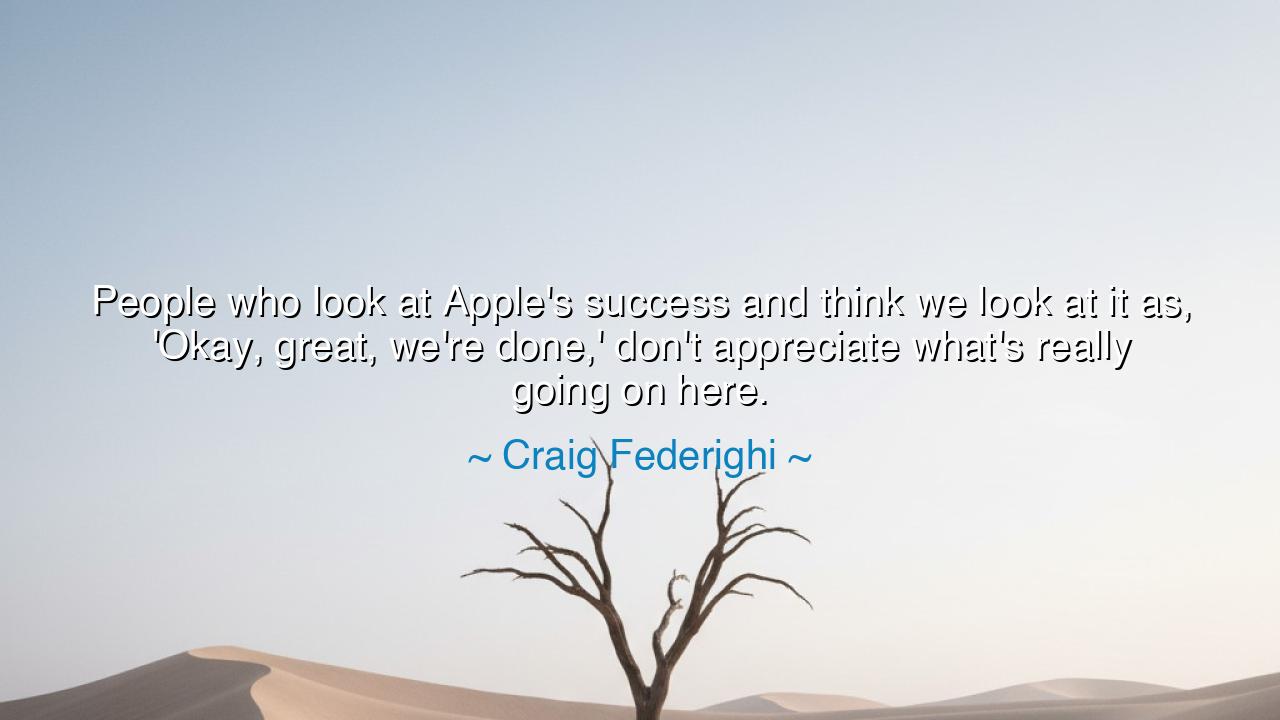
People who look at Apple's success and think we look at it as
People who look at Apple's success and think we look at it as, 'Okay, great, we're done,' don't appreciate what's really going on here.






Hear the words of Craig Federighi, who declared: “People who look at Apple’s success and think we look at it as, ‘Okay, great, we’re done,’ don’t appreciate what’s really going on here.” In this statement lies the ancient truth that true greatness is never final, that triumph is not an ending but a beginning, that the summit reached today is but the foothill of tomorrow’s mountain. For to imagine that success is completion is to misunderstand the very nature of creation itself.
Federighi speaks of a principle that has guided not only his company, but every enduring endeavor of mankind: restlessness in excellence. The wise know that the moment one cries “we are done,” decline has already begun. For invention, like a river, cannot be dammed without stagnation. The spirit of innovation demands movement, growth, and unceasing curiosity. Thus, Apple’s true power is not the gleam of devices already made, but the fire of questions still unanswered.
The ancients taught this through the tale of Odysseus, who, though he returned home to Ithaca after long wandering, could not remain still. In later legends, it was said he sailed once more, unable to rest, compelled by the hunger of discovery. His story is the story of all visionaries: that even after glory, there remains the longing for new horizons. To stand still is to betray one’s destiny; to press forward is to remain alive.
History reminds us of those who failed to heed this lesson. Consider Xerxes of Persia, who after building his empire and conquering lands, believed his power secure. He became complacent, declaring himself a god among men. Yet his armies faltered at Salamis, and his empire began to crumble. His mistake was not lack of might, but the belief that he was “done.” Federighi warns against this same error: to think of success as a final resting place, rather than as a platform for greater striving.
Thus the meaning of his words becomes clear: success is not an endpoint, but a responsibility. Every victory demands stewardship, every achievement demands further growth. For when success is treated as final, it rots; but when success is treated as a seed, it flowers into new creation. This is the rhythm of all greatness, whether of nations, artists, or inventors.
The lesson for us, O seekers, is to never mistake accomplishment for completion. If you have won a prize, let it fuel you to strive higher. If you have built something good, let it inspire you to build something better. Celebrate victories, yes, but do not make altars of them. Instead, honor them as mile-markers on an unending road. For the spirit that says “we are done” dies, but the spirit that says “we are just beginning” lives forever.
Practically, this means we must cultivate humility and hunger. Humility, to see that our present work, however successful, is not perfect. Hunger, to push forward into unknown challenges, even when comfort tempts us to rest. Ask yourself always: “What more can I learn? What more can I give? What more can I create?” By living in this way, we walk the path not of fleeting glory, but of enduring legacy.
Thus, the words of Craig Federighi resound with timeless wisdom: “People… don’t appreciate what’s really going on here.” What is going on, O children of tomorrow, is the eternal truth that greatness is not in resting, but in renewing. Take this to heart, and you too shall never be finished, but always becoming—forever climbing, forever creating, forever alive.






AAdministratorAdministrator
Welcome, honored guests. Please leave a comment, we will respond soon